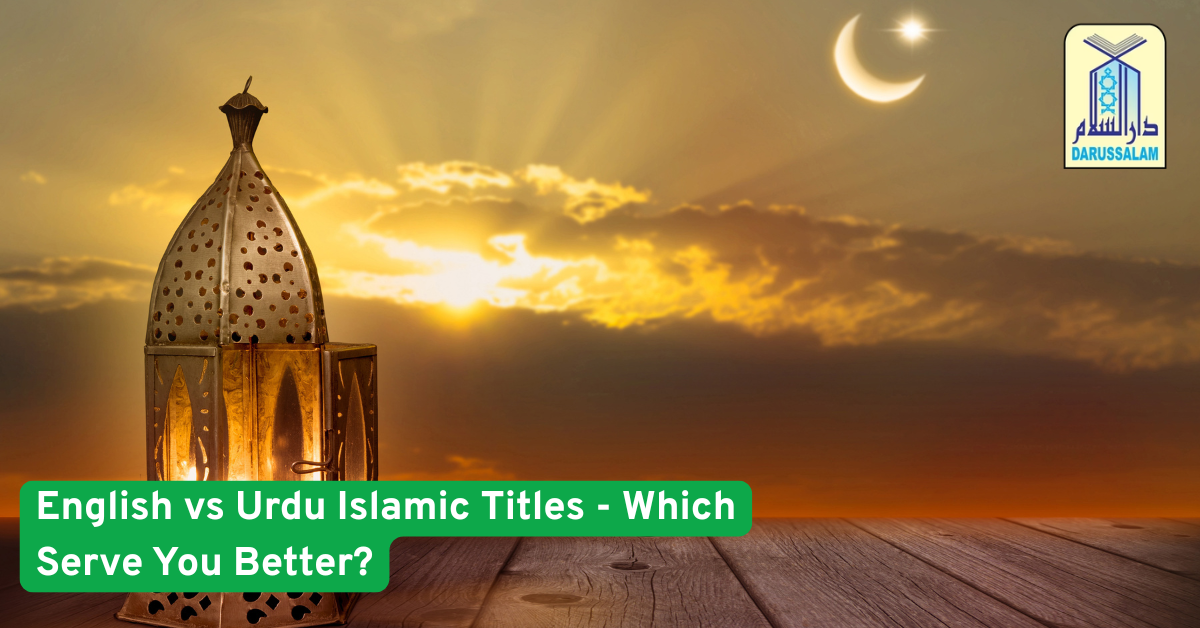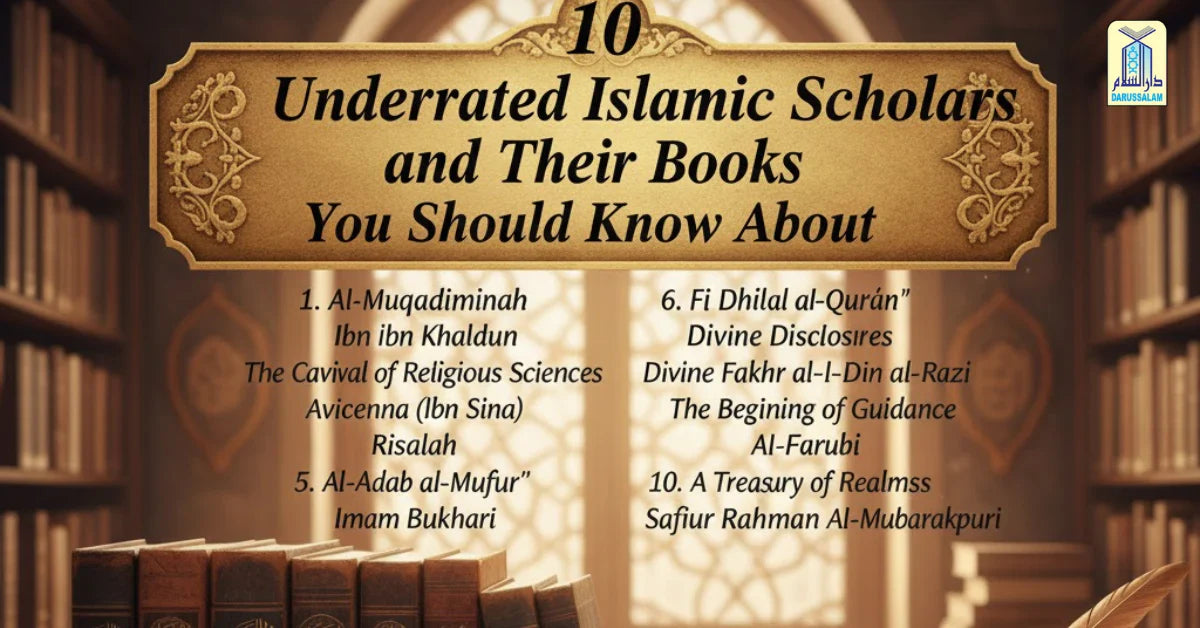When it comes to Islamic books and literature, the debate between English vs Urdu Islamic titles has become more relevant than ever. As the Muslim community in the USA continues to grow, many seek religious knowledge in various languages that resonate with their daily lives. So, whether you're looking for Islamic titles in English or Urdu, it’s essential to understand how each language impacts accessibility, understanding, and engagement with the content. In this article, we’ll explore the key differences between these two options and help you make an informed decision about which serves you better.
Why Are English and Urdu Islamic Titles Important?
In a rapidly globalizing world, access to religious texts is more important than ever. Muslims across the globe, particularly in non-Muslim-majority countries like the USA, often find themselves at a crossroads when choosing which language best suits their needs. English vs Urdu Islamic titles represent two key ways of connecting with sacred knowledge, but they cater to different audiences.
English Islamic books have become increasingly popular, especially for Muslims in non-Arabic-speaking countries. The modern-day Muslim who speaks English as their first language may find English books more accessible and relatable, enabling them to understand the teachings and principles of Islam more effectively. On the other hand, Urdu Islamic titles serve those who are more comfortable with Urdu, whether as a second language or as part of their cultural heritage. Urdu remains a significant language for many Muslims, especially those from South Asia.
The Benefits of English Islamic Titles
-
Global Accessibility: English is often seen as the global lingua franca, which means English Islamic titles can be easily understood by Muslims around the world. Books in English are also widely available across various platforms, including online stores and libraries.
-
Comprehension and Relatability: For many, especially those born in Western countries, English may be their first or most comfortable language. Books written in English allow these readers to connect deeply with Islamic teachings, using language they understand best.
-
Resource Availability: As Islam continues to grow in Western nations, more Islamic titles in English are being produced to meet the needs of diverse audiences. From scholarly articles to simple guides, English resources cover a wide range of topics, making it easier for Muslims to find answers to their questions.
-
Appeal to Younger Generations: The younger, English-speaking Muslim population often prefers English titles as it feels more contemporary and engaging. The use of English also facilitates communication across multicultural communities, helping bridge the gap between Islamic traditions and modern living.
The Benefits of Urdu Islamic Titles
-
Cultural and Linguistic Connection: Urdu holds immense cultural value in many parts of the Muslim world, especially in countries like Pakistan, India, and Bangladesh. For many Muslims, Urdu Islamic titles not only provide knowledge but also offer a sense of cultural heritage, preserving traditions that are passed down through generations.
-
Deeper Understanding for Native Urdu Speakers: For Muslims whose primary language is Urdu, reading Islamic texts in their native tongue ensures a more profound understanding. The nuances and expressions specific to Urdu can make certain theological concepts more relatable and accessible.
-
Rich Literary Tradition: Urdu has a long history of Islamic scholarship, and many renowned Islamic scholars have written their works in this language. Urdu Islamic titles offer a deep connection to this legacy, providing readers with an opportunity to explore classical Islamic texts, poetry, and interpretations in a language they cherish.
-
Engagement with Classic Islamic Works: Many original Islamic works, especially those by classical scholars, were written in languages that evolved into Urdu over time. As a result, Urdu Islamic titles often include rich commentaries and insights that help readers connect with foundational Islamic teachings in a meaningful way.
Which Language Should You Choose: English or Urdu?
The choice between English vs Urdu Islamic titles depends largely on personal preferences and cultural context. If you're a native English speaker or are more familiar with English, you'll likely find English Islamic titles to be more accessible. These books will help you understand Islamic principles in a language that you’re comfortable with.
On the other hand, if you come from a family or cultural background where Urdu is spoken regularly, or if you feel a deep connection to Urdu literature, Urdu Islamic titles could resonate more with you. They not only cater to your linguistic preferences but also help preserve a rich cultural heritage that connects you with centuries of Islamic scholarship.
Why Choose DarusSalam Publishers for Your Islamic Book Needs?
We understand the significance of both English and Urdu Islamic titles. As a leading publisher of Islamic literature, we strive to meet the diverse needs of the Muslim community. Whether you're looking for authentic translations of the Quran, scholarly books on Islamic history, or religious texts for daily guidance, we offer a vast selection in both English and Urdu.
Our commitment to quality and authenticity ensures that every book we publish upholds the teachings of Islam, providing you with reliable and insightful resources to strengthen your faith and knowledge.
Frequently Asked Questions (FAQs)
-
Why are English Islamic books becoming more popular?
English books are more accessible to a wider audience, especially Muslims living in non-Arabic speaking countries.
-
What is the primary benefit of Urdu Islamic books?
Urdu books provide cultural and linguistic relevance for many Muslims, especially those from South Asia.
-
Can I find both English and Urdu Islamic books at DarusSalam Publishers?
Yes, we offer a wide range of Islamic titles in both languages.
-
Are English Islamic books suitable for children?
Absolutely! We have a variety of books tailored for young readers in English, from storybooks to simplified Quranic teachings.
-
How does reading Islamic books in Urdu help me understand my faith better?
Reading in Urdu connects you to your cultural roots and provides deeper insights into classical Islamic teachings.
-
Which language should I choose for my first Islamic book?
It depends on your comfort level with the language. English is great for a global perspective, while Urdu offers a richer connection to Islamic heritage.
-
Do DarusSalam Publishers provide translations of famous Urdu Islamic works?
Yes, we offer reliable translations of classic Urdu Islamic works into English for a broader audience.
-
Can I find books on specific Islamic topics in both languages?
Yes, we offer specialized Islamic books on topics like Fiqh, Tafsir, and Hadith in both English and Urdu.
-
Do you offer online shopping for English and Urdu books?
Yes, you can easily browse and purchase Islamic books in both languages through our website.
-
Are DarusSalam's Islamic books available for international shipping?
Yes, we ship worldwide, making our collection accessible to Muslims everywhere.
Make the Right Choice with DarusSalam Publishers
The choice between English vs Urdu Islamic titles comes down to your personal preferences and linguistic background. Whether you choose English for its accessibility or Urdu for its cultural richness, the most important thing is that you find books that resonate with you and deepen your understanding of Islam.
We are dedicated to providing high-quality, authentic Islamic books in both languages. Explore our collection today and find the perfect titles to enrich your faith and knowledge.





